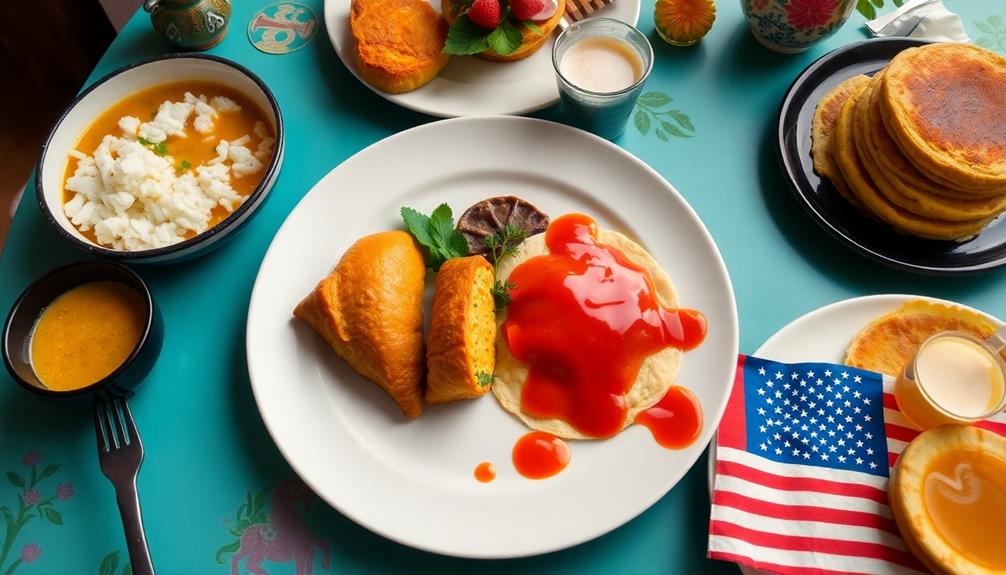Different cultures approach breakfast with distinct flavors and traditions, showcasing their culinary heritage. In Turkey, you'd enjoy a spread of cheeses and olives, while in India, spicy dishes like puri with aloo ki sabji tantalize your taste buds. Meanwhile, Filipinos relish hearty meals like tapsilog, emphasizing breakfast as a substantial affair. In France, you'd find delightful coffee paired with flaky pastries. Each breakfast reflects local agriculture, social practices, and family bonds, creating a rich tapestry of morning rituals. If you're curious about how globalization and modern trends influence these traditions, there's much more to explore.
Key Takeaways
- Traditional breakfast dishes vary widely, reflecting local ingredients and culinary heritage, such as Turkish kahvalti or Indian puri with aloo ki sabji.
- Breakfast serves as a social event in many cultures, encouraging communal sharing and connections, exemplified by Turkish kahvaltı or Italian coffee rituals.
- Unique breakfast experiences highlight cultural diversity, with dishes like Chinese congee or Moroccan hssoua belboula dchicha showcasing regional flavors and traditions.
- Family bonding over breakfast is significant, with shared meals fostering connection, as seen in German breakfasts or Indonesian treats.
- Agricultural influences shape breakfast options globally, with local crops like India's wheat and Egypt's fava beans dictating traditional breakfast choices.
Traditional Breakfast Dishes
When you think of breakfast, consider the vibrant array of traditional dishes that different cultures offer.
In Turkey, a traditional Turkish breakfast, or kahvalti, stands out with its diverse spread of cheeses, olives, fresh bread, jams, and spicy sausages, all typically enjoyed with a cup of Turkish tea. This communal meal invites you to explore different flavors and textures, making it a delightful start to the day.
In India, common breakfast might include puri served with aloo ki sabji, a spicy potato curry, or sweet kesari, showcasing the country's rich culinary heritage. Additionally, dishes like Mushroom Masala can also be enjoyed at breakfast, offering a hearty vegetarian option.
Meanwhile, in Myanmar, you might savor mohinga, a comforting soup made from fish broth, rice noodles, and fried fritters, reflecting the local taste for hearty meals.
In Egypt, ful medames, a flavorful dish of fava beans stewed with cumin, offers a fulfilling breakfast choice, often paired with pita bread.
The Philippines puts forth a breakfast culture featuring pan de sal, fried rice with longganisa, and tapsilog, highlighting the importance of breakfast as a substantial meal.
Each of these dishes embodies the unique flavors and traditions of their respective cultures.
Simple and Flavorful Options
Discover the simplicity and burst of flavors that characterize breakfast options around the world. Each culture presents unique yet straightforward meals that highlight their ingredients and traditions, making breakfast an important meal of the day.
| Country | Breakfast Options | Key Ingredients |
|---|---|---|
| Morocco | Fresh bread, jam, hssoua belboula dchicha | Mint tea, cracked barley soup |
| Brazil | Pão francês, pingado, fresh fruit juices | Steamed milk, coffee, cheese bread |
| Germany | Brötchen with meats, cheeses, and muesli | Bread rolls, marmalade |
| Poland | Kanapki (open-faced sandwiches) | Cold cuts, cheeses, fresh vegetables |
| France | Croissants and pastries | Quality butter, coffee |
These breakfast options reflect the essence of each culture. In Morocco, the hospitality shines through with fresh bread and warm tea. Brazil's light fare combines comfort with refreshment, while Germany's hearty choices guarantee you're ready for the day ahead. Poland's kanapki are perfect for a quick yet satisfying bite, and France's focus on quality elevates simple pastries to a delightful experience. Enjoy exploring these flavorful beginnings!
Coffee and Pastry Traditions
Coffee and pastry traditions around the world come together to create delightful morning experiences that awaken the senses. Each culture brings its unique flair, enhancing the way you enjoy your breakfast.
For instance, in Japan, breakfast can sometimes include traditional sweets like dorayaki, which features fluffy pancakes filled with sweet red bean paste, adding a unique touch to the morning meal. traditional Japanese confection
Here are a few remarkable traditions:
- France: You can't go wrong with a buttery croissant or pain au chocolat, perfectly paired with a café au lait. This combo highlights France's mastery in pastry craftsmanship and coffee culture.
- Spain: If you prefer a lighter start, try tostada—toasted bread drizzled with tomato and olive oil—alongside a comforting café con leche. This Mediterranean approach adds a revitalizing twist to your morning.
- Italy: In Italy, mornings are simple yet satisfying with biscotti or cornetti, often complemented by a strong espresso. This reflects the Italian love for high-quality coffee and delicious pastries.
Incorporating these traditions into your breakfast routine not only diversifies your palate but also connects you to the rich cultural practices surrounding coffee and pastry.
Each bite and sip tells a story, inviting you to savor every moment.
Unique Culinary Experiences
Breakfast offers a world of unique culinary experiences that reflect the diverse cultures from which they originate. When you immerse yourself in a Chinese breakfast, you might find yourself savoring congee, a warm rice porridge topped with pickled vegetables and salted meats—perfect for a nourishing start to your day.
Additionally, you might encounter dishes like Red-Braised Pork Belly, which, although typically enjoyed during later meals, showcases the rich flavors that define Chinese cuisine.
In Greece, you can indulge in thick, rich Greek yogurt drizzled with honey and sprinkled with nuts, often paired with boiled eggs and cold cuts, showcasing the Mediterranean diet's delights.
Traveling to Russia, your breakfast could feature kasha, blini, and syrniki, each dish presenting a delightful mix of textures and flavors that make for a comforting meal.
Meanwhile, in Morocco, expect a warm and inviting breakfast scene with mint tea, bread with jam, and hssoua belboula dchicha, a lovely cracked barley soup that embodies local hospitality.
Cultural Insights on Breakfast
Cultural insights into breakfast reveal how this meal serves as a reflection of local customs and lifestyles around the globe.
You'll find that breakfast includes a variety of dishes, each offering a glimpse into a culture's unique values and traditions. For instance, in Brazil, breakfast often features elements like fresh fruits and breads, reflecting the country's rich agricultural diversity and traditional dishes.
Here are three remarkable examples:
- Turkey: Breakfast is a social event featuring a delightful spread of small plates like cheeses, olives, and jams. The phrase "breakfast is before coffee" emphasizes its significance in daily life.
- India: A typical Indian breakfast is vibrant and diverse, with dishes like puri with aloo ki sabji or kesari. This showcases a rich use of spices and flavors that vary across regions.
- Philippines: Here, breakfast is the largest meal of the day, commonly including fried rice with longganisa or tapsilog, highlighting the importance of hearty meals to kickstart the day.
These examples show how breakfast, around the world, serves not just as a meal, but as a cultural touchstone, bringing people together and reflecting societal priorities.
Breakfast Staples Around the World
Across various cultures, morning meals showcase a fascinating array of staples that reflect local tastes and traditions. In India, breakfast features puri served with aloo ki sabji or kesari, highlighting vibrant spices and flavors that awaken your senses.
If you find yourself in the Philippines, you'd enjoy a traditional breakfast that includes pan de sal, fried rice with longganisa, and tapsilog, turning your morning into the largest meal of the day. In addition, many cultures incorporate regional dishes like Muamba De Galinha in Angola, which emphasizes the importance of communal dining and family gatherings.
In Turkey, kahvalti offers a delightful spread of cheeses, olives, breads, and spicy Turkish sausage, inviting communal dining accompanied by soothing Turkish tea.
Meanwhile, a typical German breakfast often consists of Brötchen, cold cuts, cheeses, soft-boiled eggs, and muesli, emphasizing hearty and varied options to fuel your day.
If you're in Brazil, sip on pingado—steamed milk and coffee—while enjoying pão francês and fresh fruit juices, reflecting the nation's love for coffee.
Finally, the full English breakfast, a classic in the UK, features eggs, bacon, sausages, baked beans, and toast, providing a substantial start to the day.
Each culture's breakfast staples tell a unique story, connecting you to their culinary heritage.
Regional Breakfast Variations
Exploring regional breakfast variations reveals how diverse culinary practices can be, even within a single country. Each region boasts its own popular breakfast dish, showcasing unique ingredients and flavors.
In Lebanon, for instance, breakfast often features savory options like Kawarma, a preserved meat dish that adds a rich and savory start to the day.
In India, you might enjoy puri served with aloo ki sabji, a reflection of vibrant and spicy cuisine that varies across states.
If you find yourself in Myanmar, don't miss mohinga—a fish broth soup with rice noodles and lemongrass, highlighting the country's seafood-rich culinary heritage.
In Egypt, breakfast typically consists of ful medames, fava beans stewed with spices and served with pita bread, emphasizing the legume's importance in Middle Eastern diets.
In the Philippines, breakfast is the most substantial meal of the day, featuring items like pan de sal, longganisa, and tapsilog, which balance flavors and textures beautifully.
Meanwhile, Turkish kahvalti offers a communal experience, showcasing a variety of small dishes including cheeses, olives, and menemen, underscoring the importance of sharing.
These regional breakfast variations not only fill your stomach but also connect you to the cultural essence of each place.
Breakfast as a Social Event
Breakfast isn't just about food; it's a shared morning ritual that brings people together.
In Italy, for instance, breakfast often features light pastries and coffee, reflecting a culture that values simplicity and quality.
Whether you're bonding with family over a traditional Full English breakfast or enjoying a Turkish kahvalti with friends, these meals create connections and foster conversations.
As you gather around the table, you're not just eating; you're participating in a cultural exchange that enriches your experience, much like indulging in traditional stuffed pasta during a festive gathering.
Shared Morning Rituals
Many cultures embrace breakfast as a cherished social event, where the act of sharing food fosters connections among family and friends. This communal aspect can be enhanced by dishes that celebrate local ingredients, such as Nettle and Potato Soup, which not only nourish the body but also encourage conversation around the table.
These shared morning rituals create a sense of belonging and community, setting a positive tone for the day ahead. You can observe this communal aspect of breakfast around the world in various ways:
- Turkey's Kahvalti: This lavish spread encourages everyone to sample different dishes, promoting lively discussions and bonding over culinary delights.
- German Breakfasts: Here, you'll find leisurely meals that allow families to enjoy each other's company while sharing stories and laughter, emphasizing the importance of social interaction.
- Philippine Breakfasts: Often the largest meal of the day, dishes like tapsilog gather family members around the table, reinforcing cultural traditions and familial ties.
Whether it's in a bustling hotel breakfast buffet or a cozy home, the act of gathering for breakfast plays a significant role in deepening relationships.
Family Bonding Over Breakfast
Gathering around the breakfast table can transform a simple meal into a cherished family event. In many cultures, breakfast isn't just about food; it's an essential time for family bonding.
For instance, in Turkey, the traditional kahvaltı features numerous small plates that encourage communal sharing, turning breakfast into a leisurely experience that can last for hours. Similarly, in Germany, families come together for a substantial breakfast, enjoying a variety of breads, cheeses, and meats, fostering a sense of togetherness before the day begins.
In Indonesia, breakfast might include delightful treats like Kue Putu or Dadar Gulung, which not only add flavor but also create opportunities for family enjoyment and connection.
In the Philippines, breakfast stands out as the largest meal of the day, served with diverse dishes that invite family members to sit down and enjoy each other's company.
Even in places to eat like hotel breakfast buffets, you can witness this cultural practice. Here, international guests bond over shared meals, exchanging stories and experiences that enhance social interactions.
No matter where you are, breakfast serves as an opportunity to strengthen family ties and create lasting memories.
Cultural Exchange at Tables
Across cultures, the breakfast table often becomes a vibrant space for cultural exchange and social interaction. Whether it's the Turkish kahvaltı with its array of small plates or the leisurely German breakfasts enjoyed with family, these meals foster a sense of togetherness.
In Mexico, breakfast favorites like Chilaquiles showcase how traditional dishes can be both a culinary delight and a way to use up leftover ingredients. You can experience this cultural richness in various ways:
- Shared Dishes: In the Philippines, breakfast can be the largest meal of the day, featuring hearty dishes like tapsilog that bring families together, reinforcing strong bonds.
- Buffet Experiences: Breakfast buffets at international hotels serve as cultural hubs, allowing guests to sample multiple cuisines, creating connections among travelers from diverse backgrounds.
- Regional Conversations: Enjoying a Full English breakfast often sparks discussions about local specialties and culinary traditions, enhancing cultural exchange at the dining table.
These shared breakfast experiences highlight not just the food but also the stories and customs that come with it.
Influences of Agriculture on Breakfast
Agricultural practices play a key role in shaping what you eat for breakfast, as local crops and livestock dictate your morning options.
Depending on where you are, you might enjoy rice and spices in Asia or hearty grains in Europe, all influenced by the region's farming traditions.
Understanding these connections can really enrich your appreciation for the diverse breakfasts around the world.
Regional Crop Availability
Regional crop availability directly impacts what's on your breakfast table, shaping the dishes people enjoy based on local resources.
Depending on where you are, breakfast can vary dramatically. Here are three key influences of agriculture on your morning meal:
- Staple Grains: In India, wheat and rice are abundant, leading to popular dishes like puri and idli. These grains form the foundation of many breakfast options, providing nourishment and flavor.
- Local Legumes: In Egypt, fava beans are cultivated extensively, making ful medames a breakfast staple. This hearty dish showcases how regional crops, like beans, are incorporated into daily meals.
- Dairy & Seafood: In Turkey, fresh dairy products are readily available, resulting in a diverse breakfast spread featuring cheeses and yogurt.
Meanwhile, in Myanmar, the rich fishing industry means dishes like mohinga, made with local fish, are a breakfast favorite.
Traditional Farming Practices
The ingredients on your breakfast plate are often a reflection of traditional farming practices in your area. These practices directly influence what you enjoy for your first meal of the day, as local crops dictate the availability of ingredients.
For instance, in India, the cultivation of wheat and rice leads to popular dishes like puri and idli, illustrating the link between agriculture and breakfast foods.
In Egypt, fava beans thrive in the Nile Delta, making Ful Medames a staple morning choice that showcases local agricultural influence.
Similarly, in the United Kingdom, livestock farming supports the iconic Full English breakfast, complete with eggs, bacon, and sausages sourced from nearby farms.
Seasonal agricultural practices also shape your breakfast menu.
In Brazil, the abundance of tropical fruits and fresh coffee from local plantations becomes a vibrant part of the morning meal.
Each region's unique farming customs not only enrich your breakfast options but also connect you to the land and its resources.
Embracing these traditional practices allows you to appreciate the diverse flavors and textures that define breakfast around the world.
Modern Breakfast Trends
Breakfast has transformed dramatically in recent years, with many people gravitating toward convenient options that fit their fast-paced lives.
You'll notice modern breakfast trends emphasize quick, nutritious choices, catering to your busy mornings. Health-conscious eating is a priority, and here are a few popular options you might consider:
- Smoothie Bowls: Packed with fruits, veggies, and superfoods, they offer a revitalizing start to your day.
- Overnight Oats: These aren't only easy to prepare but also customizable, allowing you to add toppings that suit your taste and dietary needs.
- Breakfast Bars: Ideal for those on the go, these bars combine convenience and nutrition in one portable package.
Additionally, the rise of brunch culture has turned breakfast into a social event, featuring dishes like avocado toast and gourmet pancakes.
You might also notice how globalization influences breakfast menus, with fusion dishes like Korean breakfast burritos becoming more common.
Meal prepping has become a staple for many, ensuring healthy breakfasts are ready for the week ahead.
Embracing these modern breakfast trends can make your mornings more enjoyable and in line with your health goals.
Frequently Asked Questions
How Does Breakfast Differ Around the World?
Breakfast differs around the world through unique ingredients and traditions. You'll find vibrant spices in India, hearty rolls in Germany, filling meals in the Philippines, social spreads in Turkey, and balanced plates in Japan.
What Is Breakfast Culture?
What's your favorite way to start the day? Breakfast culture shapes your mornings, reflecting local traditions and values. It's not just food; it's about community, connection, and the unique flavors that energize your routine.
Why Is Breakfast Important Around the World?
Breakfast's important because it fuels your day, boosts energy, and enhances focus. By starting your morning with a nutritious meal, you set a positive tone for productivity and strengthen social bonds with those you share it with.
What Is the Concept of Breakfast?
Breakfast's concept revolves around starting your day right. You gather energy and nutrients, creating a morning routine that can vary from quick bites to elaborate feasts, reflecting personal habits and cultural influences shaping your choices.
Conclusion
In exploring how different cultures approach breakfast, you discover that this meal reflects deeper social and agricultural influences. The theory that breakfast serves as a daily ritual rather than just sustenance holds true, as it fosters community and connection across various traditions. From simple fare to elaborate spreads, breakfast unites people and showcases local flavors. So, the next time you sit down for breakfast, consider the rich cultural tapestry that shapes your morning meal.










